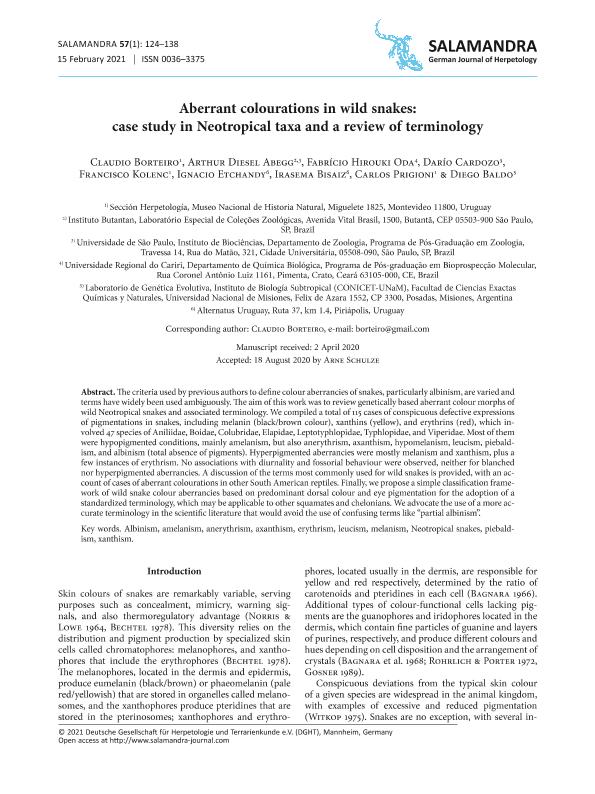Mostrar el registro sencillo del ítem
dc.contributor.author
Borteiro, Claudio
dc.contributor.author
Diesel Abegg, Arthur
dc.contributor.author
Hirouki Oda, Fabrício
dc.contributor.author
Cardozo, Dario Elbio

dc.contributor.author
Kolenc, Francisco
dc.contributor.author
Etchandy, Ignacio
dc.contributor.author
Bisaiz, Irasema
dc.contributor.author
Prigioni, Carlos
dc.contributor.author
Baldo, Juan Diego

dc.date.available
2022-05-04T12:08:15Z
dc.date.issued
2021-02
dc.identifier.citation
Borteiro, Claudio; Diesel Abegg, Arthur ; Hirouki Oda, Fabrício ; Cardozo, Dario Elbio; Kolenc, Francisco; et al.; Aberrant colouration in wild snakes: case study in Neotropical taxa and a review of terminology; Deutsche Gesellschaft für Herpetologie und Terrarienkunde; Salamandra; 57; 2-2021; 124-138
dc.identifier.issn
0036-3375
dc.identifier.uri
http://hdl.handle.net/11336/156430
dc.description.abstract
The criteria used by previous authors to define colour aberrancies of snakes, particularly albinism, are varied and terms were usually used ambiguously. The aim of this work was to review genetically based aberrant colour morphs of wild Neotropical snakes and associated terminology. We compiled a total of 115 cases of conspicuous defective expression of pigments in snakes, including melanin (black/brown colour), xanthins (yellow), and erythrins (red), which involved 47 species of Aniliidae, Boidae, Colubridae, Elapidae, Leptotyphlopidae, Typhlopidae, and Viperidae. Most of them were hypopigmented conditions, mainly amelanism, but also anerythrism, axanthism,hypomelanism, leucism, piebaldism, and albinism (total absence of pigments). Hyperpigmented aberrancies were mostly melanism and xanthism, plus a few instances of erythrism. No associations with diurnality and fossorial behaviour were observed, neither for blanched nor hyperpigmented aberrancies. A discussion of terms most used for wild snakes is provided, with an account of cases of aberrant colouration in other South American reptiles. Finally, we propose a simple classification framework of wild snake colour aberrancies based on dorsal main colour and eye pigmentation for the adoption of a standardized terminology, that may be applicable to other squamates and turtles. We claim for a more accurate terminology in the scientific literature, that would avoid the use of confusing terms like partial albinism.
dc.format
application/pdf
dc.language.iso
eng
dc.publisher
Deutsche Gesellschaft für Herpetologie und Terrarienkunde
dc.rights
info:eu-repo/semantics/openAccess
dc.rights.uri
https://creativecommons.org/licenses/by-nc-sa/2.5/ar/
dc.subject
Albinism
dc.subject
amelanism
dc.subject
anerythrism
dc.subject
axanthism
dc.subject
erythrism
dc.subject
leucism
dc.subject
melanism
dc.subject
Neotropical snakes
dc.subject
piebaldism
dc.subject
xanthism
dc.subject.classification
Zoología, Ornitología, Entomología, Etología

dc.subject.classification
Ciencias Biológicas

dc.subject.classification
CIENCIAS NATURALES Y EXACTAS

dc.title
Aberrant colouration in wild snakes: case study in Neotropical taxa and a review of terminology
dc.type
info:eu-repo/semantics/article
dc.type
info:ar-repo/semantics/artículo
dc.type
info:eu-repo/semantics/publishedVersion
dc.date.updated
2022-03-29T19:03:46Z
dc.journal.volume
57
dc.journal.pagination
124-138
dc.journal.pais
Alemania

dc.description.fil
Fil: Borteiro, Claudio. Museo Nacional de Historia Natural de Santiago; Chile
dc.description.fil
Fil: Diesel Abegg, Arthur. Universidade Estadual Paulista Julio de Mesquita Filho; Brasil
dc.description.fil
Fil: Hirouki Oda, Fabrício. Museo Nacional de Historia Natural de Santiago; Chile
dc.description.fil
Fil: Cardozo, Dario Elbio. Consejo Nacional de Investigaciones Científicas y Técnicas. Centro Científico Tecnológico Conicet - Nordeste. Instituto de Biología Subtropical. Instituto de Biología Subtropical - Nodo Posadas | Universidad Nacional de Misiones. Instituto de Biología Subtropical. Instituto de Biología Subtropical - Nodo Posadas; Argentina
dc.description.fil
Fil: Kolenc, Francisco. Museo Nacional de Historia Natural de Santiago; Chile
dc.description.fil
Fil: Etchandy, Ignacio. No especifíca;
dc.description.fil
Fil: Bisaiz, Irasema. No especifíca;
dc.description.fil
Fil: Prigioni, Carlos. Museo Nacional de Historia Natural de Santiago; Chile
dc.description.fil
Fil: Baldo, Juan Diego. Consejo Nacional de Investigaciones Científicas y Técnicas. Centro Científico Tecnológico Conicet - Nordeste. Instituto de Biología Subtropical. Instituto de Biología Subtropical - Nodo Posadas | Universidad Nacional de Misiones. Instituto de Biología Subtropical. Instituto de Biología Subtropical - Nodo Posadas; Argentina
dc.journal.title
Salamandra
dc.relation.alternativeid
info:eu-repo/semantics/altIdentifier/url/https://www.salamandra-journal.com/index.php/home/contents/2021-vol-57/2016-borteiro-c-a-d-abegg-f-h-oda-d-cardozo-f-kolenc-i-etchandy-i-bisaiz-c-prigioni-d-baldo/file
Archivos asociados
